
Foumban: The Heartbeat of Cameroon's Culture and History
Nestled in the western highlands of Cameroon, Foumban is a city that breathes history and culture. Known as the cultural capital of the Bamoun people, this city offers a rich tapestry of traditions, arts, and architecture that date back centuries. As you wander through its bustling streets, you'll be transported back in time, surrounded by the vibrant colors and sounds that define this unique destination. The Royal Palace of Foumban is the crown jewel of the city. This historic site, which still serves as the residence of the Bamoun Sultan, is a marvel of traditional African architecture. The palace also houses the Museum of Bamoun Arts and Tradition, where you can explore a collection of artifacts, royal regalia, and intricate wood carvings that tell the story of the Bamoun dynasty. Foumban is also renowned for its thriving arts and crafts scene. Artisans here are masters of their craft, creating stunning bronze sculptures, intricate beadwork, and woven textiles. A visit to the artisanal market is a must, where you can watch these craftsmen at work and even purchase a unique piece to take home. The city's cultural festivals, such as the Ngoun Festival, are vibrant celebrations that offer a glimpse into the Bamoun people's heritage and traditions. Beyond its cultural allure, Foumban is set against a backdrop of lush landscapes and rolling hills. The natural beauty of the region provides a serene escape from the urban hustle. Whether you're exploring the historical sites, immersing yourself in the local arts, or simply enjoying the scenic views, Foumban promises an enriching and unforgettable experience.
Local tips in Foumban
- Visit the Royal Palace early in the day to avoid crowds and have a more personal experience.
- Carry local currency (CFA Franc) as many markets and smaller vendors do not accept card payments.
- Learn a few phrases in the local language, Bamoun, to connect better with the locals.
- Check the local festival calendar; attending the Ngoun Festival can be a highlight of your trip.
- Dress modestly when visiting cultural and religious sites to show respect for local customs.
Foumban: The Heartbeat of Cameroon's Culture and History
Nestled in the western highlands of Cameroon, Foumban is a city that breathes history and culture. Known as the cultural capital of the Bamoun people, this city offers a rich tapestry of traditions, arts, and architecture that date back centuries. As you wander through its bustling streets, you'll be transported back in time, surrounded by the vibrant colors and sounds that define this unique destination. The Royal Palace of Foumban is the crown jewel of the city. This historic site, which still serves as the residence of the Bamoun Sultan, is a marvel of traditional African architecture. The palace also houses the Museum of Bamoun Arts and Tradition, where you can explore a collection of artifacts, royal regalia, and intricate wood carvings that tell the story of the Bamoun dynasty. Foumban is also renowned for its thriving arts and crafts scene. Artisans here are masters of their craft, creating stunning bronze sculptures, intricate beadwork, and woven textiles. A visit to the artisanal market is a must, where you can watch these craftsmen at work and even purchase a unique piece to take home. The city's cultural festivals, such as the Ngoun Festival, are vibrant celebrations that offer a glimpse into the Bamoun people's heritage and traditions. Beyond its cultural allure, Foumban is set against a backdrop of lush landscapes and rolling hills. The natural beauty of the region provides a serene escape from the urban hustle. Whether you're exploring the historical sites, immersing yourself in the local arts, or simply enjoying the scenic views, Foumban promises an enriching and unforgettable experience.
When is the best time to go to Foumban?
Unmissable attractions to see
Hotel De Ville De Foumban
Explore the rich cultural heritage of the Bamoun people at Hotel De Ville De Foumban, a unique museum and historical landmark in the heart of Foumban.
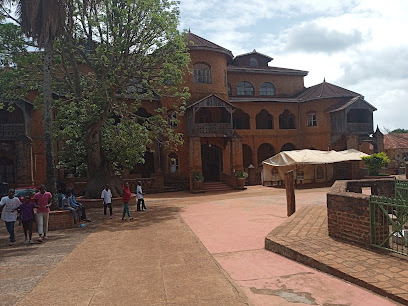
Musée De Foumban
Explore the rich cultural heritage of Cameroon at Musée De Foumban, a treasure trove of history and art from the Bamoun Kingdom.
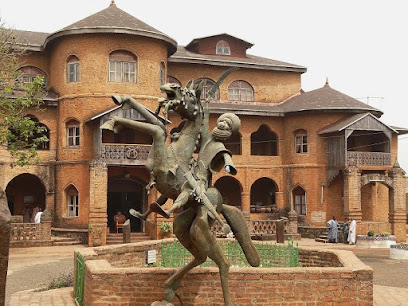
Porte D'entrée Foumban
Explore the rich cultural heritage of Cameroon at Porte D'entrée Foumban, a unique museum showcasing traditional art and artifacts.
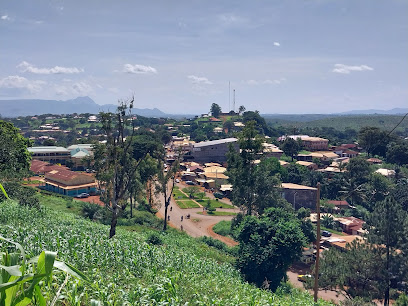
Chefferie Supérieure FONTAIN
Explore the rich heritage of the Bamoun people at Chefferie Supérieure FONTAIN, a captivating museum in Foumban, Cameroon.
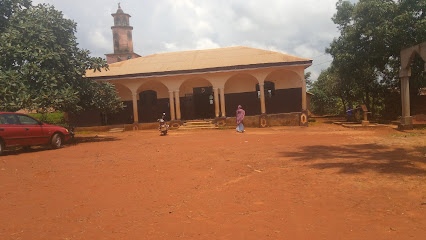
FOUMBAN ROYAL PALACE
Explore the grandeur of the Foumban Royal Palace, a museum celebrating the rich culture and history of the Bamoun Kingdom in Cameroon.
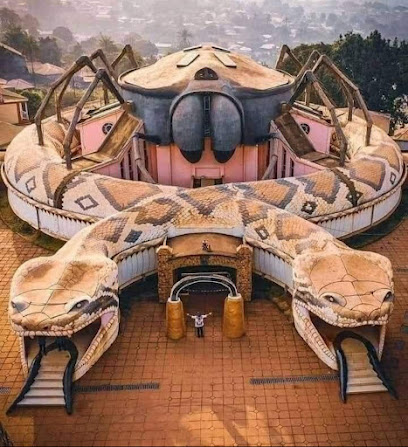
Musée des Rois Bamoun
Explore the Musée des Rois Bamoun in Foumban, a captivating museum showcasing the rich cultural heritage of the Bamoun Kingdom through art and artifacts.
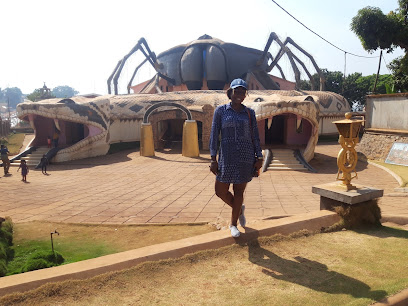
Place des fêtes de Foumban
Immerse yourself in the cultural tapestry of Cameroon at Place des fêtes de Foumban, where history and tradition come alive.
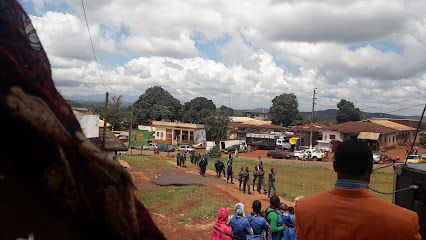
Kamalis Parc
Experience the joy of water adventures at Kamalis Parc in Foumban, where fun and relaxation await visitors of all ages.
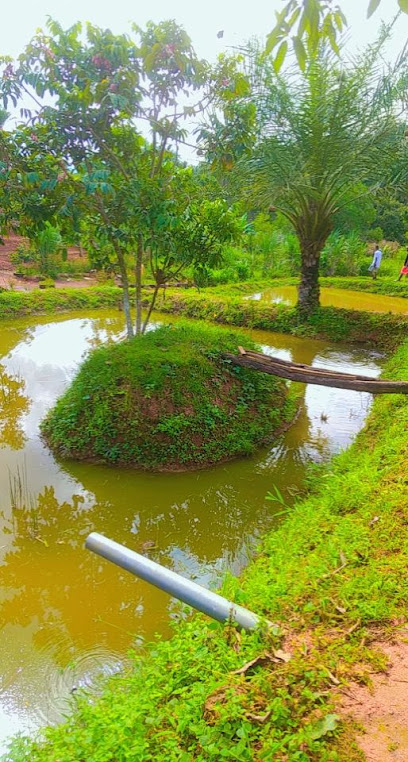
Place des fêtes de Massangam
Explore the cultural heartbeat of Massangam at Place des fêtes de Massangam, where local traditions come alive in a vibrant community setting.
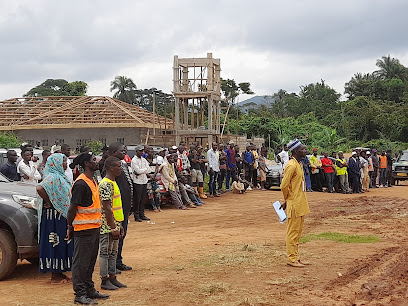
Foyèt-jipouoche
Explore the stunning natural beauty and rich cultural heritage of Foyêt-jipouoche, a hidden gem in Cameroon perfect for adventurous travelers.

KEYLA EXPRESS FOUMBAN
Experience serene relaxation at Keyla Express in Foumban, where lush greenery and tranquil ambiance invite you to unwind and explore nature.

Pont du Nshi NJIKETNKIE
Discover the architectural beauty and cultural significance of the Pont du Nshi NJIKETNKIE in Foumban, a must-see tourist attraction in Cameroon.
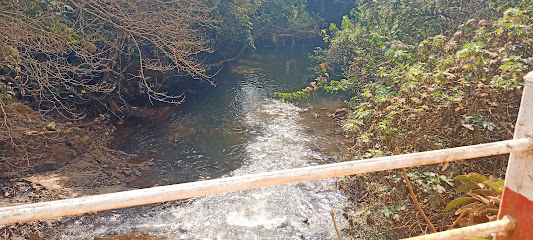
Rivière Meghah
Explore the serene beauty of Rivière Meghah in Koutaba, Cameroon, where nature and tranquility come together for a perfect getaway.

Carrefour cimencam
Explore Carrefour Cimencam in Foumbot, a vibrant marketplace that showcases local culture, crafts, and cuisine in a welcoming atmosphere.

Camp btap
Experience the breathtaking landscapes and rich biodiversity at Camp Btap, a captivating tourist attraction in Koutaba, Cameroon.

Essential places to dine
Printemps
Discover affordable culinary delights at Printemps in Foumban - where tradition meets taste in every dish.
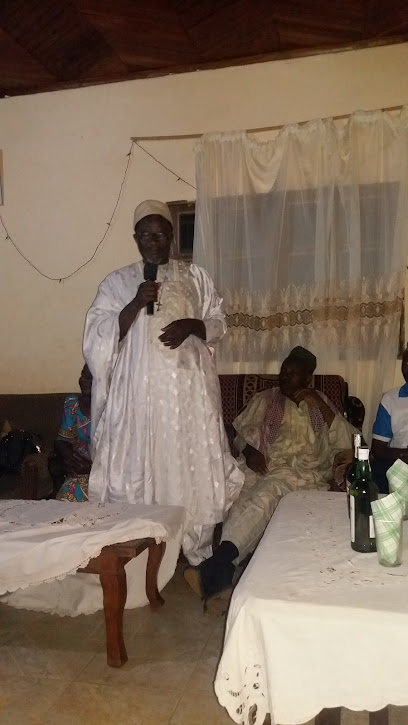
Retrouvailles Bar
Experience the vibrant nightlife at Retrouvailles Bar in Foumban, where local culture meets affordable drinks in a welcoming atmosphere.
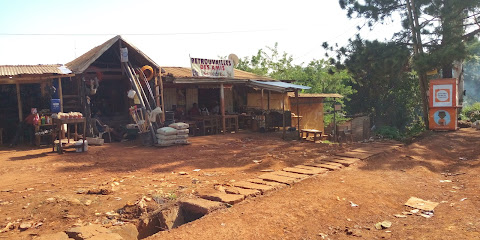
Restaurant La Saveur
Experience the rich flavors of Cameroon at Restaurant La Saveur – where every meal is a journey through local culinary traditions.
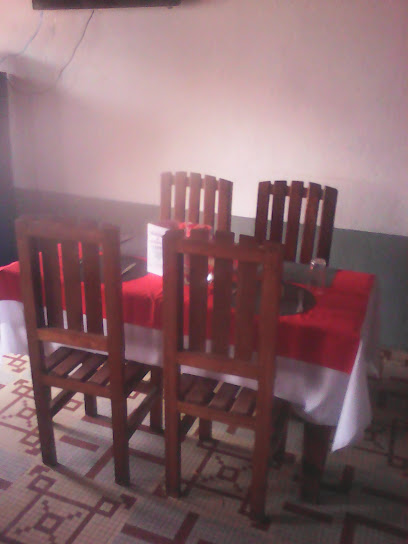
SANTA ROSA
Experience authentic Cameroonian cuisine at Santa Rosa in Foumban – where flavor meets tradition in a vibrant atmosphere.
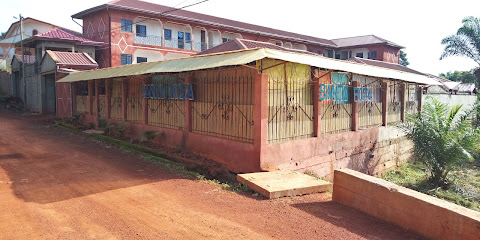
The Place To Be Foumbam
Experience cultural immersion and comfort at The Place To Be Foumbam - your gateway to exploring the rich heritage of Cameroon.
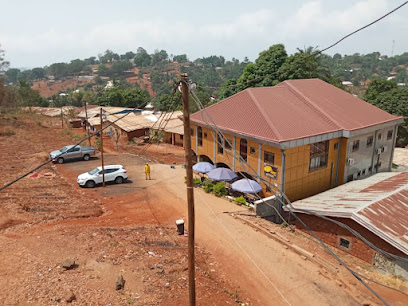
total foumban 1
Discover authentic Cameroonian flavors at Total Foumban 1, a cozy restaurant offering delicious local dishes in the heart of Foumban.

Restaurant Les Délices
Experience authentic Cameroonian cuisine at Restaurant Les Délices in Foumban - where every dish tells a story.
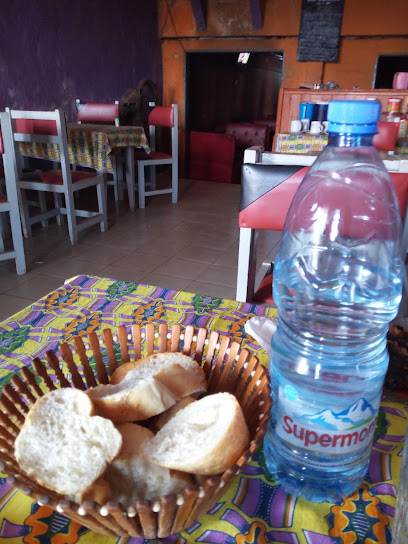
Cawacha
Experience the vibrant atmosphere and authentic local culture at Cawacha Bar in Foumban - perfect for unwinding after a day of exploration.

Sans Soucie Bar
Discover the vibrant spirit of Cameroon at Sans Soucie Bar, where affordable drinks meet friendly faces in a lively atmosphere.

Restaurant Label Foumban
Experience authentic Cameroonian cuisine at Restaurant Label Foumban in Centre Ville - where every dish tells a story.
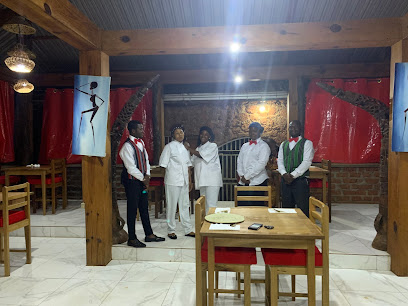
Restaut La Maturite
Experience authentic Cameroonian cuisine at Restaut La Maturite in Foumban – where every meal tells a story.
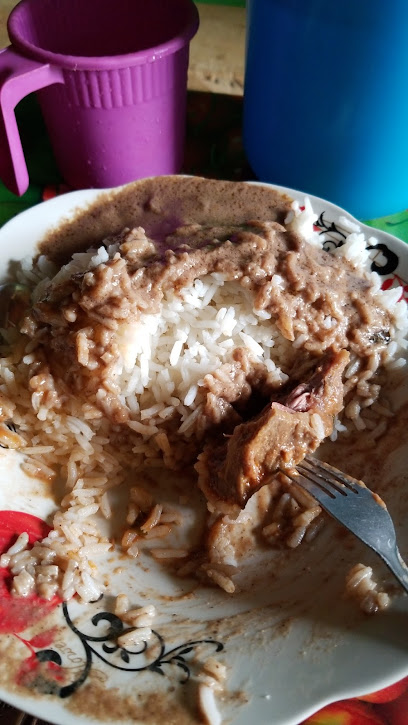
CAFE ROYAL PLUS
Discover authentic Cameroonian cuisine at Café Royal Plus in Foumban - where every dish tells a story.

No Name Place( chez Nah Pat )
Experience authentic Cameroonian cuisine at No Name Place (chez Nah Pat) in Foumban—where flavors tell stories.
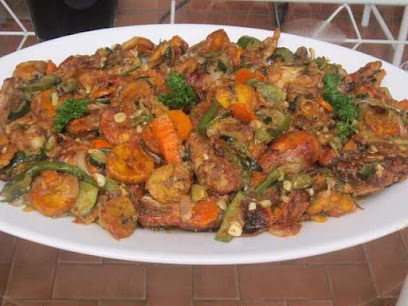
Njayou Home Restaurant/Boutique
Discover the heart of Cameroon at Njayou Home Restaurant - where every dish tells a story.
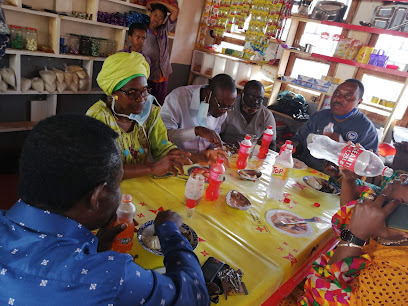
City French
Experience authentic Cameroonian flavors at City French Cafe in Foumban - a perfect blend of culture and cuisine awaits!
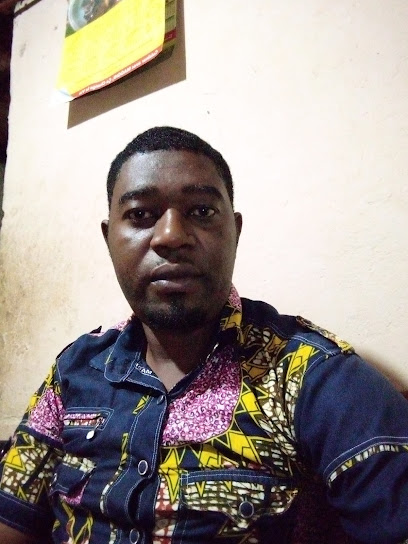
Markets, malls and hidden boutiques
Foumban 1
Discover the excitement of betting at Foumban 1, a lively off-track betting shop offering a unique blend of local culture and thrilling entertainment.
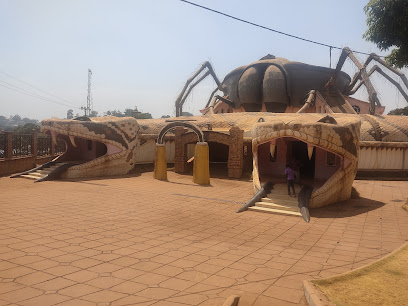
Musée De Foumban
Explore the heart of Bamoun culture at Musée De Foumban, home to stunning artifacts and rich historical narratives of Cameroon.
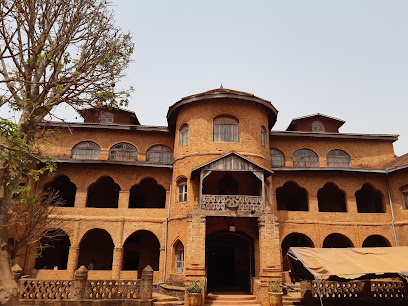
Halal center
Explore the Halal Center in Foumban for a unique shopping experience featuring halal products and rich cultural offerings.
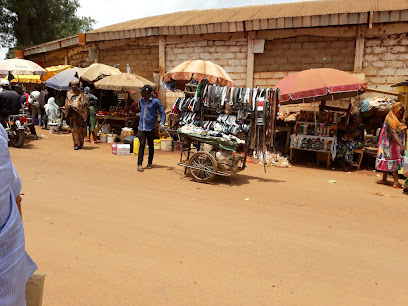
MARCHE CENTRAL
Experience the colorful markets and authentic local cuisine at Marche Central, a vibrant shopping destination in Foumban, Cameroon.
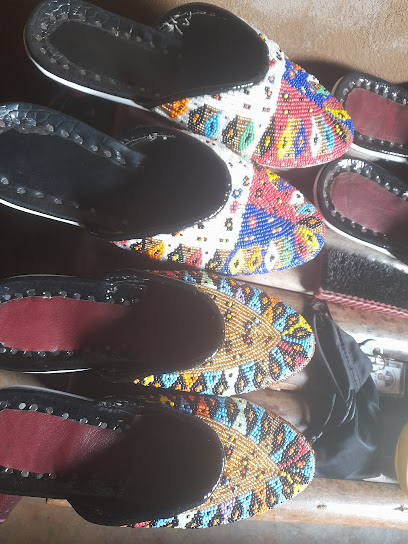
La concorde, NJINDEN, FOUMBAN, CAMEROUN
Experience the authentic flavors of Cameroon at La Concorde in Foumban, where local cuisine meets cultural heritage in a warm and inviting atmosphere.
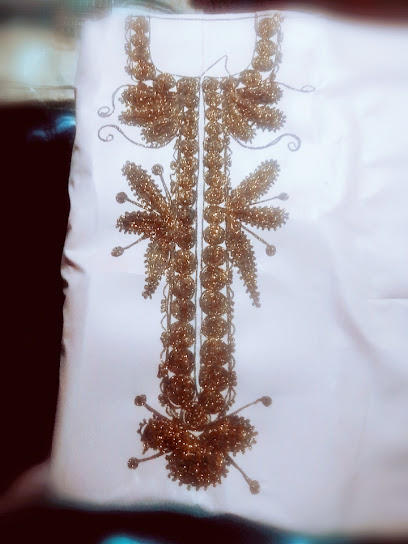
Africa Global Initiative
Explore unique home goods at Africa Global Initiative in Foumban, where every purchase supports local artisans and celebrates Cameroonian culture.
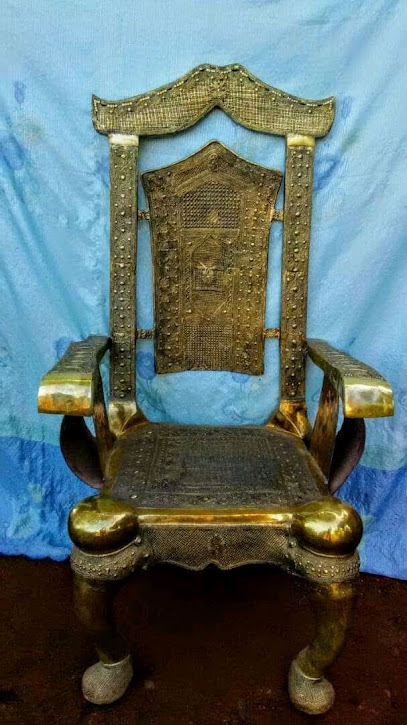
La Maison du Café Foumban
Discover the heart of Foumban at La Maison du Café, where rich brews and local culture blend seamlessly in a welcoming atmosphere.
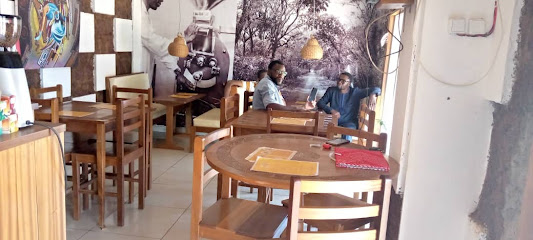
Boutique Orange KOUTABA
Discover the latest in mobile technology at Boutique Orange Koutaba, your essential cell phone store in Koutaba, Cameroon.
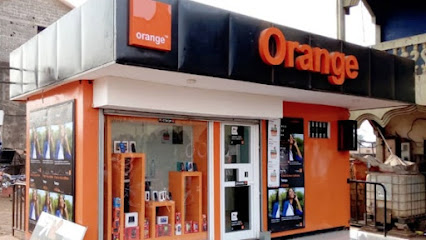
PHARMACIE LES GALAXIES
Pharmacie Les Galaxies in Foumban: Your trusted health resource with a wide selection of pharmaceutical products and expert advice.

Diaspora Construction Sarl
Discover quality construction supplies and tools at Diaspora Construction Sarl in the heart of Foumban, Cameroon, your go-to hardware store.

Boutique du Coin
Discover local flavors and artisanal goods at Boutique du Coin, the charming grocery store in the heart of Foumban, Cameroon.

abattoir njilom
Experience the culinary heart of Cameroon at Abattoir Njilom in Foumban, where quality meats and local flavors come together.
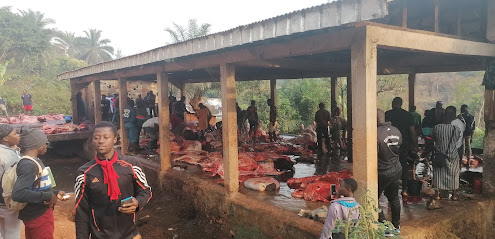
carrefour Ntieche
Discover Carrefour Ntieche in Foumban: Your gateway to local crafts, culture, and everyday essentials in a vibrant shopping atmosphere.
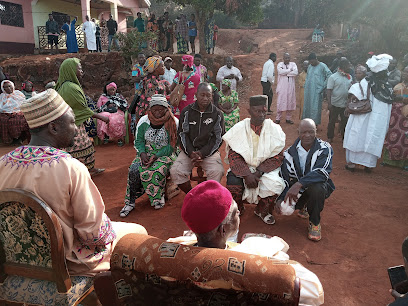
Pharmacie Gamma-Rx
Explore Foumban with peace of mind at Pharmacie Gamma-Rx, a trusted pharmacy providing health solutions and local expertise.
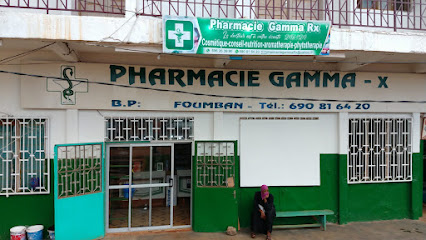
Nsangou Et Fils Électriques
Explore Nsangou Et Fils Électriques in Foumban for quality electronics and unique local products at competitive prices.
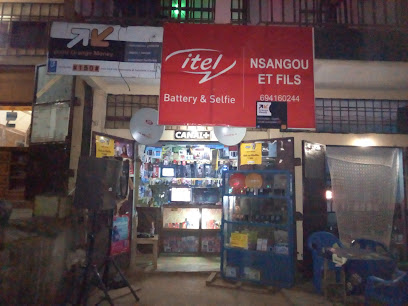
Essential bars & hidden hideouts
Printemps
Experience the flavors of Foumban at Printemps, where local cuisine and warm hospitality meet in a vibrant setting.
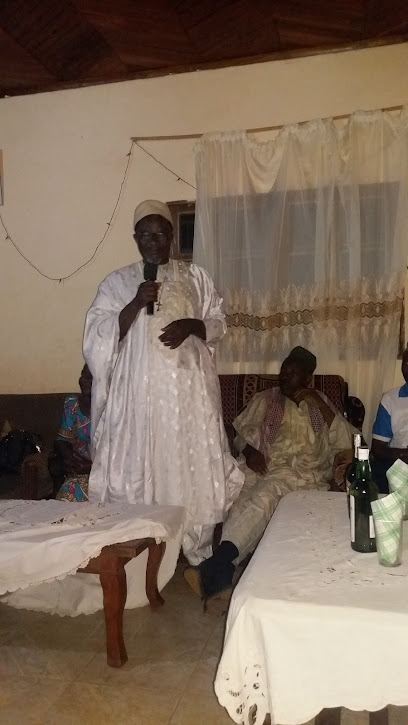
Retrouvailles Bar
Experience the vibrant local nightlife at Retrouvailles Bar in Foumban, where affordability meets a welcoming atmosphere and cultural charm.
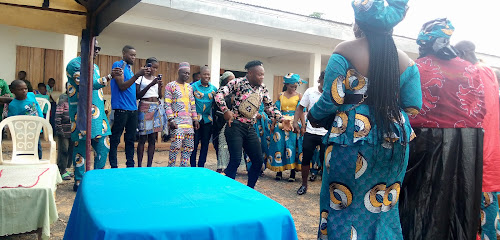
Restaurant La Saveur
Experience the authentic flavors of Cameroon at Restaurant La Saveur in Foumban, where every dish tells a story.
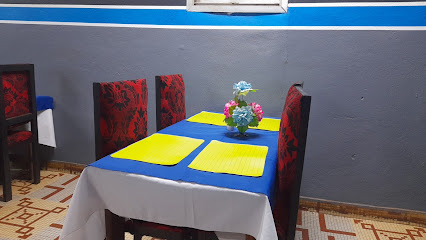
SANTA ROSA
Experience the rich flavors of Cameroonian cuisine at Santa Rosa in Foumban, a culinary gem offering a warm ambiance and delicious traditional dishes.
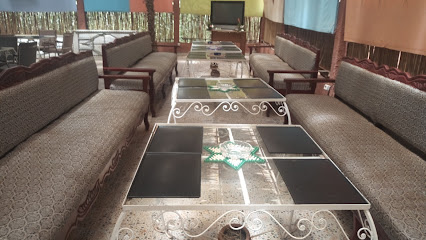
total foumban 1
Experience authentic Cameroonian cuisine at Total Foumban 1, where local flavors and warm hospitality meet in a vibrant setting.

Cawacha
Explore the vibrant nightlife of Foumban at Cawacha, a lively bar offering a delightful selection of drinks and a welcoming atmosphere.

Sans Soucie Bar
Discover the vibrant nightlife of Foumban at Sans Soucie Bar, where local culture and refreshing drinks come together in a lively atmosphere.

Restaurant Label Foumban
Explore the authentic flavors of Cameroon at Restaurant Label Foumban in Centre Ville, where tradition meets modern dining.
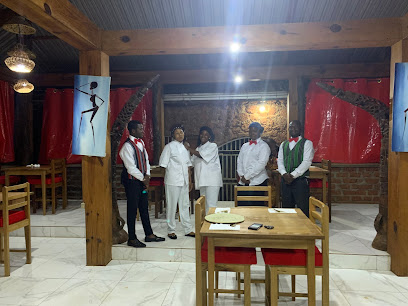
CAFE ROYAL PLUS
Explore the flavors of Cameroon at Café Royal Plus in Foumban, where local cuisine meets a cozy atmosphere for an unforgettable dining experience.

No Name Place( chez Nah Pat )
Experience authentic Cameroonian cuisine at No Name Place (chez Nah Pat) in the heart of Foumban, where tradition meets flavor in every dish.
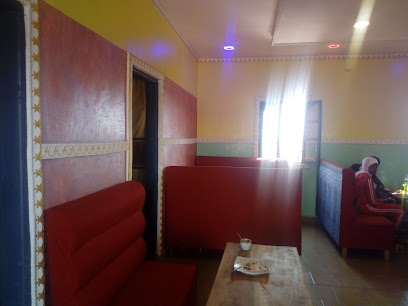
Central Tchap's
Discover the lively energy of Central Tchap's, a premier live music bar in Foumban, where local culture meets unforgettable nightlife.
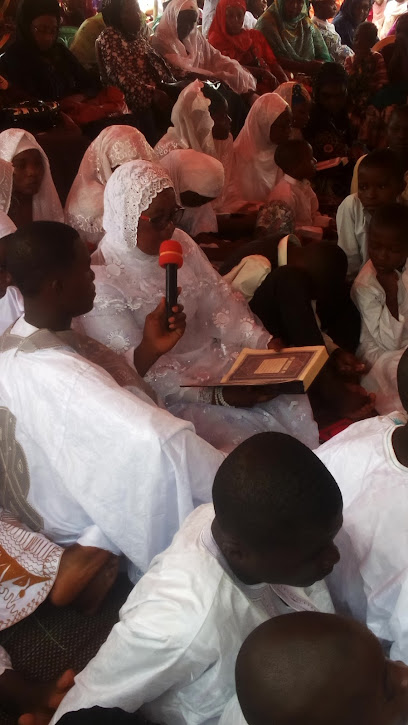
Mambain Cawacha
Experience the vibrant culture and local hospitality at Mambain Cawacha, the perfect bar for relaxation in Foumban.

Kamalys parc
Experience the flavors of Foumban at Kamalys Parc, a top restaurant offering authentic local cuisine in a warm and inviting atmosphere.
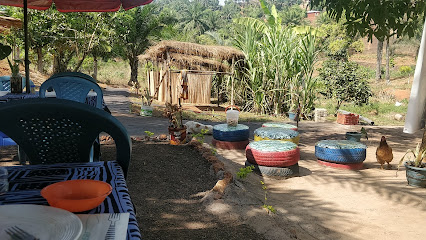
Mini-resteau
Experience authentic Cameroonian cuisine at Mini-resteau in Foumban, a must-visit restaurant for culinary enthusiasts.

Local Phrases
-
- HelloBoni
[bo-ni] - GoodbyeNyambe
[nya-mbe] - YesEya
[e-ya] - NoEyi
[e-yi] - Please/You're welcomeKilim
[ki-lim] - Thank youSara
[sa-ra] - Excuse me/SorryNjanga
[njan-ga] - How are you?Nda awa?
[nda a-wa] - Fine. And you?Tugwa. Nda?
[tug-wa. nda] - Do you speak English?Dzi nna English?
[dzi na en-glish] - I don't understandNzama ndi
[nza-ma ndi]
- HelloBoni
-
- I'd like to see the menu, pleaseNdi nji boni menu, kilim
[ndi nji bo-ni menu, ki-lim] - I don't eat meatNjanga ndi boni nyama
[njan-ga ndi bo-ni nya-ma] - Cheers!Bewa!
[be-wa] - I would like to pay, pleaseNdi nji fai, kilim
[ndi nji fai, ki-lim]
- I'd like to see the menu, pleaseNdi nji boni menu, kilim
-
- Help!Ngi!
[ngi] - Go away!Njanga!
[njan-ga] - Call the Police!Dzi nna wu Police!
[dzi na wu police] - Call a doctor!Dzi nna wu dokita!
[dzi na wu do-ki-ta] - I'm lostNjanga ndi boni
[njan-ga ndi bo-ni] - I'm illNjanga ndi zinzin
[njan-ga ndi zin-zin]
- Help!Ngi!
-
- I'd like to buy...Ndi nji fai...
[ndi nji fai] - I'm just lookingNjanga ndi boni
[njan-ga ndi bo-ni] - How much is it?Nda nji wu?
[nda nji wu] - That's too expensiveNda ndi boni sasisi
[nda ndi bo-ni sa-si-si] - Can you lower the price?Dzi nna piga sasisi?
[dzi na pi-ga sa-si-si]
- I'd like to buy...Ndi nji fai...
-
- What time is it?Nda ngay?
[nda nga-y] - It's one o'clockNda ngay wa tsi
[nda nga-y wa tsi] - Half past (10)Nda ngay wa sisa
[nda nga-y wa si-sa] - MorningLanga
[lan-ga] - AfternoonFodzom
[fo-dzom] - EveningSiyam
[si-yam] - YesterdayMfom
[m-fom] - TodayTsi
[tsi] - TomorrowNtsi
[ntsi] - 1Tsi
[tsi] - 2Nyi
[nyi] - 3Sia
[si-a] - 4Nyim
[nyim] - 5Nzui
[n-zui] - 6Vio
[vi-o] - 7Nya
[nya] - 8Nyia
[nyi-a] - 9Sia
[si-a] - 10Sisa
[si-sa]
- What time is it?Nda ngay?
-
- Where's a/the...?Nda ngay a/the...?
[nda nga-y a/the] - What's the address?Nda ngay wu address?
[nda nga-y wu address] - Can you show me (on the map)?Dzi nna wu boni (on the map)?
[dzi na wu bo-ni (on the map)] - When's the next (bus)?Nda ngay wu bus nde?
[nda nga-y wu bus nde] - A ticket (to ....)Wu ticket (to ....)
[wu ticket (to)]
- Where's a/the...?Nda ngay a/the...?
History of Foumban
-
Foumban, also known as Fumban, is a city located in the West Region of Cameroon. The city was founded in the 14th century by the Bamum people, led by their first king, Ncharé Yen. The Bamum migrated to this region as they sought fertile land and a strategic location to establish their kingdom. The choice of Foumban was influenced by its favorable geographic conditions and its potential for agricultural development.
-
One of the most remarkable figures in Foumban's history is King Ibrahim Njoya, who reigned from the late 19th century into the early 20th century. King Njoya was a visionary leader and an innovator. He is credited with creating the Bamum script, a written language known as Shümom, which enabled the documentation of the Bamum people's history, culture, and administrative matters. His reign was also marked by efforts to modernize the kingdom, including the introduction of new agricultural techniques and the construction of the Royal Palace, which still stands as a testament to his legacy.
-
In the late 19th century, Foumban and the Bamum Kingdom came under German colonial rule. The Germans were interested in the region due to its strategic location and agricultural potential. During this period, the Bamum Kingdom was integrated into the German colony of Kamerun. The German administration introduced new infrastructure and education systems but also imposed taxes and labor requirements on the local population. This era ended after World War I when Cameroon was divided between the French and the British under a League of Nations mandate.
-
Following the defeat of Germany in World War I, the League of Nations mandated the administration of Foumban to France. Under French rule, the region experienced significant changes, particularly in the realms of education, infrastructure, and governance. The French continued to exert influence over the traditional structures of the Bamum Kingdom, which led to a blend of traditional and colonial governance. This period saw the introduction of Western education and the French language, which have had lasting impacts on the region's culture and society.
-
Foumban played a pivotal role in the lead-up to Cameroon's independence from French colonial rule. In 1961, the city hosted the Foumban Conference, a crucial meeting where leaders from the British and French-administered territories of Cameroon discussed the terms of unification. The conference led to the creation of the Federal Republic of Cameroon, marking a significant step towards the country's full independence. Foumban's role in this historical event is a point of pride for its residents and a significant chapter in the nation's history.
-
Foumban is renowned for its rich cultural heritage, which is vividly displayed in its architecture, arts, and crafts. The Royal Palace of Foumban, constructed during the reign of King Ibrahim Njoya, is a central landmark. The palace is not only an architectural marvel but also houses the Foumban Museum, which showcases a vast collection of Bamum art, historical artifacts, and royal regalia. The city is also famous for its vibrant arts and crafts scene, with local artisans producing intricate wood carvings, bronze sculptures, and colorful textiles that reflect the Bamum cultural identity.
-
One of the most significant cultural events in Foumban is the annual Ngoun Festival, a grand celebration of Bamum heritage and traditions. The festival, which typically takes place in December, features traditional music, dance, and rituals. It is a time when the Bamum people from across the region gather to honor their history and culture. The festival's highlights include the display of royal regalia, traditional wrestling matches, and the procession of the king. The Ngoun Festival offers visitors a unique opportunity to experience the vibrant cultural life of Foumban firsthand.
Foumban Essentials
-
Foumban is located in the West Region of Cameroon. The nearest major airport is Douala International Airport, approximately 300 kilometers away. From Douala, you can travel to Foumban by bus, private car, or domestic flight to Bafoussam, which is closer to Foumban. The journey by road from Douala typically takes around 6 to 8 hours. Alternatively, you can take a bus or hire a taxi from Yaoundé, which is about 280 kilometers away and takes roughly 5 to 7 hours by road.
-
Foumban is a relatively small city, and many attractions are within walking distance. Local taxis and motorcycle taxis (boda-bodas) are readily available and are a convenient means of getting around. Buses and minibuses (bush taxis) also operate within the city and connect to nearby towns. If you prefer more flexibility, you can rent a car, but be aware of local driving conditions and road quality.
-
The official currency in Cameroon is the Central African CFA Franc (XAF). Credit cards are accepted in some hotels, restaurants, and shops, but it is advisable to carry cash, especially in smaller establishments and rural areas. ATMs are available in Foumban, but it is wise to withdraw sufficient cash in larger cities like Douala or Yaoundé before traveling to ensure you have enough funds.
-
Foumban is generally a safe destination for tourists. However, it is advisable to take standard precautions. Avoid walking alone at night in unfamiliar areas and keep an eye on your belongings in crowded places. While there are no specific high-crime areas targeting tourists, it is always best to stay vigilant and aware of your surroundings. Be cautious when using motorcycle taxis and ensure you negotiate fares beforehand.
-
In case of emergency, dial 112 for immediate assistance. The local police station and medical facilities are available in Foumban. It is recommended to have travel insurance that covers medical emergencies. For minor health issues, there are pharmacies in the city where you can purchase over-the-counter medications. Make sure you have the contact information of your country's embassy or consulate in Cameroon.
-
Fashion: Do dress modestly, especially when visiting religious sites. Avoid wearing revealing clothing. Religion: Do respect local customs and traditions. Always remove your shoes when entering mosques or traditional palaces. Public Transport: Do be respectful and negotiate fares before getting into a taxi or motorcycle taxi. Don't eat or drink on public transport. Greetings: Do greet people with a handshake. Using titles and formal greetings is appreciated. Eating & Drinking: Do try local delicacies and accept food offerings graciously. Don't refuse hospitality, as it is considered impolite. Avoid eating with your left hand as it is seen as unclean.
-
To experience Foumban like a local, visit the local markets where you can buy fresh produce, traditional crafts, and artworks. Engage with locals, as they are often friendly and willing to share stories about the city's history and culture. Don't miss visiting the Sultan's Palace and the Foumban Museum of Arts and Traditions. For a unique experience, attend one of the traditional festivals or ceremonies, such as the Nguon Festival, which showcases Bamoun culture and heritage.
Nearby Cities to Foumban
-
Things To Do in Bafoussam
-
Things To Do in Mbouda
-
Things To Do in Bamenda
-
Things To Do in Dschang
-
Things To Do in Bafia
-
Things To Do in Nkongsamba
-
Things To Do in Mamfe
-
Things To Do in Yaoundé
-
Things To Do in Douala
-
Things To Do in Edea
-
Things To Do in Tiko
-
Things To Do in Buea
-
Things To Do in Limbe
-
Things To Do in Calabar
-
Things To Do in Ebolowa








